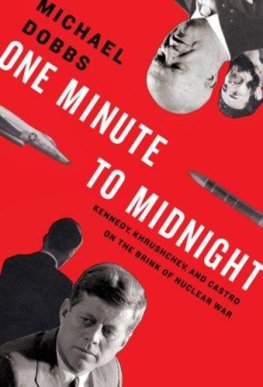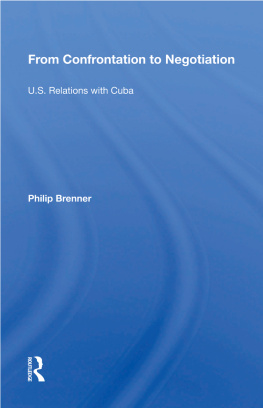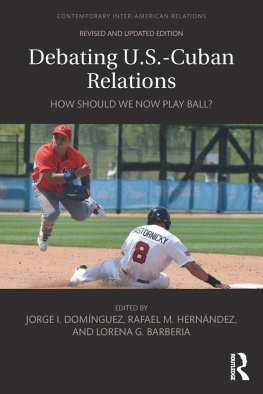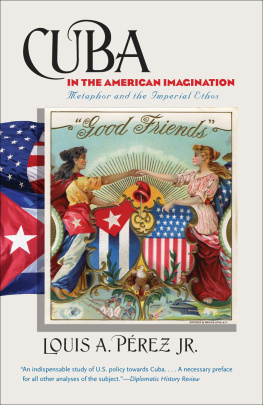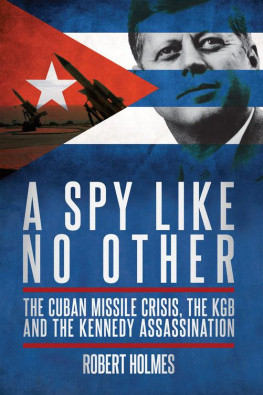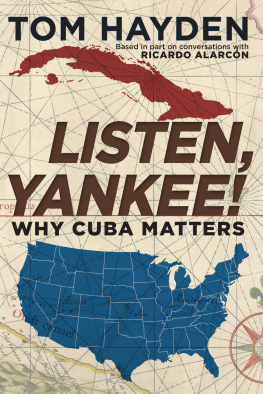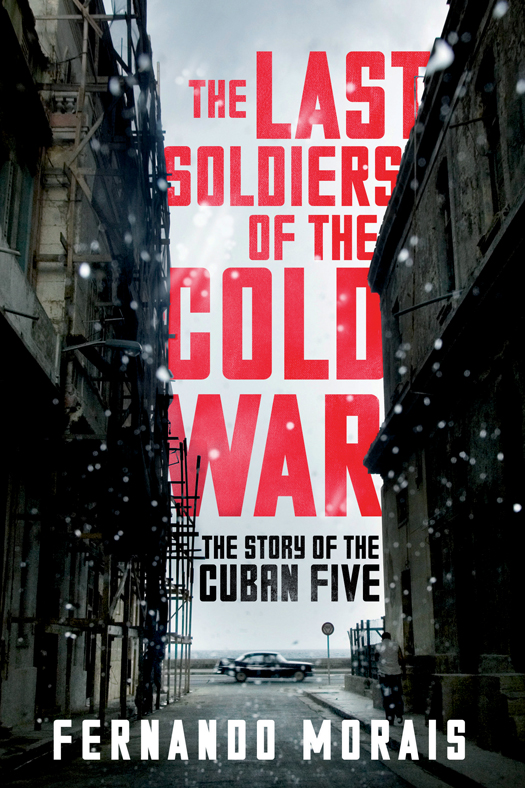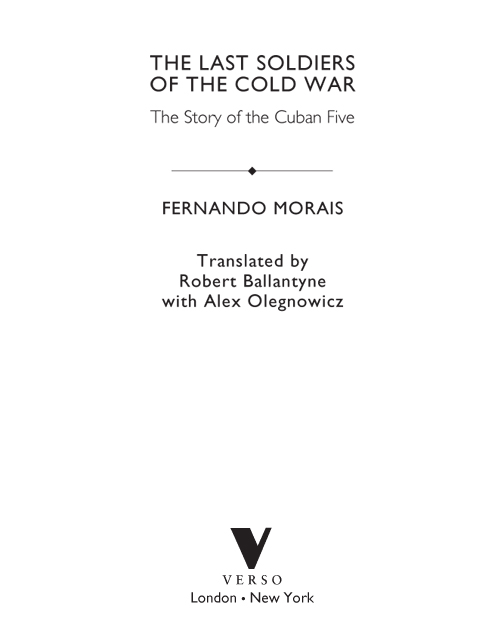FERNANDO MORAIS is one of Brazils most important contemporary writers and journalists. He has received the Esso Award three times and the April Award for journalism on four occasions. Moraiss works have sold more than two million copies in more than nineteen countries.
First published in English by Verso 2015
Translation Robert Ballantyne with Alex Olegnowicz 2015
First published as Ultimose Soldados da Guerra Fria
Companhia das Letras 2011
All rights reserved
The moral rights of the author have been asserted
Verso
UK: 6 Meard Street, London W1F 0EG
US: 20 Jay Street, Suite 1010, Brooklyn, NY 11201
www.versobooks.com
Verso is the imprint of New Left Books
ISBN-13: 978-1-78168-876-2
eISBN-13: 978-1-78168-877-9 (US)
eISBN-13: 978-1-78168-878-6 (UK)
British Library Cataloguing in Publication Data
A catalogue record for this book is available from the British Library
Library of Congress Cataloging-in-Publication Data
A catalog record for this book is available from the Library of Congress
v3.1
To Helena and Clarisse, the light of my eyes
CONTENTS
VETERAN OF THE ANGOLAN
WAR, RNE STEALS A PLANE IN
CUBA, LANDS IN MIAMI AND
RECEIVES A HEROS WELCOME
It was really hot in Havana in that late autumn of 1990. Natures only blessing, at that time of the year, is that nightfall comes early, before six oclock in the evening, sweeping the city with a fresh Caribbean breeze. It was a SaturdayDecember 8, 1990, she would never forget the dateand Olga had decided to spend her day off catching up on work at the Teneras Habana, the state company where she worked as an engineer. Around seven oclock on that overcast night, she got off the bus on tree-lined Fifth Avenue and walked a block to the modest apartment where she lived with her husband, Ren, and daughter, Irmita, in the once elegant neighborhood of Miramar, half an hour from the capitals center. As they left home late that morning, Olga had suggested to Ren that the six-year-old girl spend the day with her grandmother, freeing the parents to see the Brazilian film Estelinha, directed by Miguel de Faria Jr., which was opening the Latin American Film Festival at the Yara cinema downtown that evening.
Back home, Olga noticed that the apartment lights were out. Ren was late and the film festival would have to wait for another day. Inside, with the lights on, she saw that Dandi, her daughters dog, had chewed up a pile of old newspapers, spreading bits of paper all over the place. When she went to the kitchen to get a broom, she heard the neighbors voice:
Look, the lights have come on. Shes back.
Seconds later there was a knock at the door. Opening it, she came face to face with two solemn-looking men.
Are you Olga Salanueva, Ren Gonzlezs wife? May we come in?
Her reaction was immediate: her husband, a pilot and parachute instructor, had had an accident. What else could it be?
The man tried to calm her down:
Were from the Ministry of the Interior. Please, sit down, well explain everything.
Explain what? My husband! Whats happened to my husband? Is he injured? Is he alive?
You knew your husband was going to fly today?
Yes, I knew. What happened to him?
The answer, she would remember later, was like a blow to the head:
Your husband has defected.
Ren? Unbelievable! Ren is a veteran of Angola, a Party militant! Where did you get this idea?
Ren stole an airplane from San Nicols Airport and fled to Miami.
I dont believe it! I dont believe it! This is an insult!
Despite her distress, the man went on dryly, unflappable:
Do you have a radio? If you do, switch on Radio Mart.
Olgas tiny, battery-operated radio could tune in on shortwave to Radio Mart, a station created in May 1985 by American President Ronald Reagan to broadcast anti-Castro propaganda to the Cuban public. With her heart racing, Olga heard her husbands crystal-clear voice spreading through the house in an interview that had been broadcast over and over all afternoon:
I had to flee. In Cuba theres a shortage of electricity, a shortage of food, even potatoes and rice are rationed. The fuel for our planes is counted drop by drop.
Olgas anguish was understandable. Ren, thirty-four and six feet tall, lean with a rough face, prominent nose and faint shadows around his bright eyes, was a war hero decorated by the Cuban government. They made a handsome couple. Olga, a few inches shorter and three years younger than her husband, was an attractive woman, with distinctive eyebrows, abundant hair and a determined air. Apart from being workers children, they had both been admitted a few months earlier into the Communist Party where they were militants. And they shared a love of children and dogs. The main difference between them was that Olga was a true habanera on both sides, whereas Ren, an American citizen, had been born in Chicago. His father Cndido, a metal worker and a card-carrying communist, had emigrated to Texas in 1952 in the hope of becoming a professional baseball player. At that time, baseball was the national sport of both Cuba and the United States.
His cherished career as pitcher, however, would never go beyond the odd training session on the fields of the major league teams. Faced with a choice of going back to Cuba, where the repressive dictatorship of Fulgencio Batista (193359) awaited him, and trying his hand as a manual laborer, he chose the latter. He moved to Chicago, where he married Irma Sehwerert, the granddaugher of Germans and the daughter of Cuban emigrants, with whom he had two sonsRen was born in 1956 and Roberto in 1958. It was while living in Chicago that the family heard the news that Fidel Castro had put an end to the Batista dictatorship. In April 1961, after the attempt by the United States to invade Cuba at the Bay of Pigs, Cndido decided that it was time to return to his native land with his wife and children.
From that day until this, Ren had never again set foot in the country of his birth. When Olga met him in 1983, he was working as a flight instructor at various flying clubs around the country. Aged only twenty-seven, Ren was a veteran of the Angolan Warnot unusual in Cuba, where more than half a million people, or 5 percent of the adult male population, had taken part in military missions abroad. But Ren stood out among the roughly 300,000 Cubans who fought on the side of the Peoples Movement for the Liberation of Angola (MPLA). The MPLA was backed by the USSR, which opposed the National Front for the Liberation of Angola (FNLA) and the National Union for the Total Independence of Angola (UNITA). The FNLA was sponsored by the United States, China and Zaire, and UNITA by South Africa. After two years in the jungles of Africa, where he performed fifty-four combat missions driving Soviet tanks armed with 120-millimeter guns, Ren quit military service, but wore a medal officially designating him as an Internationalist Combatant by the government in Havana.
December 8, 1990, started like any other day. Ren woke at five and ran eight kilometers through Miramars tree-lined avenues. Back homean apartment so small that the only place to stretch and do some exercises was the tiny space by the side of the couples bedhe took a cold shower, woke Olga and together they shared a quick breakfast. They had little time for conversation. At seven sharp, Ren had to catch the bus that took him and the other workers fifty kilometers to the San Nicols de Bari civil airport, where he had been working for two years as an instructor. As they said goodbye Olga reminded him of their evening engagement:


